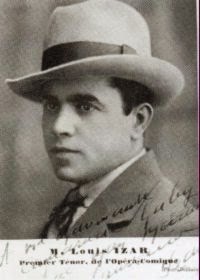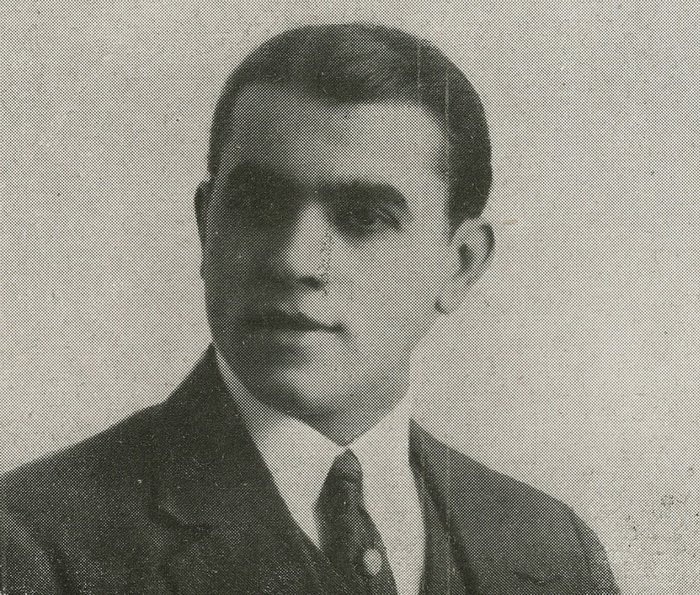He was drafted into the French army and served the full length of World War I (from December 1914 to January 1919, more
precisely); he was wounded in April 1918.
After vocal studies at the Toulouse and Paris conservatories, he made his debut in 1923 in Nice, where he stayed for three
seasons (partly at the Casino, partly at the Opéra); for instance, he sang Toinet (Le chemineau by Leroux) in
February 1924 or Alfredo and Vincent in April 1926.
He made his Opéra-Comique debut on 24 July 1925 as Vincent; he also sang Almaviva there, and was "Izar de
l'Opéra-Comique" ever since, although I'm not sure that he ever returned to that theater later on.
In July 1926, he sang Puycardas in Miss Helyett at the Gaîté-Lyrique in Paris.
He was a favorite with the audience of the Théâtre des Arts in Rouen, to which he belonged from 1926 to 1928. His
breakthrough was Mime in both Rheingold and Siegfried in the first of his two Rouen seasons; he also sang Wilhelm
Meister, Shahabarim (Salammbô), Gérald, Toinet, Alfredo, Don José and Pinkerton there.
From 29 April (world premiere) to 15 June 1927, he appeared in Cotillon III by Henri Casadesus at the
Gaîté-Lyrique.
He spent the 1928/29 season in Bordeaux, singing for instance Nicias and Don José in October, and Pinkerton in March.
For the season 1929/30, he was a member of the Théâtre Graslin in Nantes.
In February 1931, he was in Le Havre to sing Antoni in Oletta by Henry Février; in October and November, in
Roubaix for Carmen and Traviata.
In 1931/32, he was a member of the troupe in Gent; he didn't get a lot to sing as the director wasn't enthusiastic about him.
Towards the end of the season, the Gent opera house decided to premiere Das Land des Lächelns in French; in Paris,
no theater had accepted the work, which was, in spite of its success in Austria, thought to be doomed to fail. Why the Gent
director wanted to stage it nonetheless has not been handed down, but in any case, he, too, was not at all convinced it would be
successful, and so he cast his "beloved" Izar, who became thus the first Sou-Chong in French translation. It was in fact a
triumph, and made Izar famous. In one performance, he sang "Je t'ai donné mon coeur" (Dein ist mein ganzes Herz) eight
times, no less: five times in the second act where it belongs, and three more times after the end of the show. Izar repeated
the role instantly in summer at La Monnaie in Brussels.
The following November, also the Gaîté-Lyrique in Paris wanted to produce Le pays
du sourire with Izar, but now Gent wouldn't let him go for that guest appearance, so the Gaîté-Lyrique had to
cast Willy Thunis instead, who was considered much inferior to Izar. By a hair's breadth, Izar would have sung nonetheless as
Thunis fell ill before the opening night. In the last moment, it turned out that he had recovered enough to sing, but Izar was
present at the theater throughout the performance, just in case Thunis would have to bow out. Later on, Izar sang Sou-Chong many
times at the Gaîté-Lyrique, for instance in July 1933; from September of the same year, he and his
wife, Germaine Roumans, were regular members of that theater.
In April 1933, he was Sou-Chong in Marseille, and in June in Brussels; in February 1934 (and again in December 1937), in Rouen
at the Théâtre Français, in July 1934 in Aix-les-Bains and Deauville, in October/November 1935 in Lille,
in April 1937 in Bordeaux, in September 1938 and March 1939 in Roubaix, and in September 1943 in Langon.
He was a member of the Théâtre du Capitole in Toulouse in 1934/35. In October, he appeared in Mignon; in
January, as Alfredo; in February, as Pinkerton, Hoffmann and Sou-Chong; in March, in Zigeunerliebe and Mireille;
in April, in La vida breve and again in Das Land des Lächelns.
He spent the winter season 1935/36 in Belgium, singing Don José, Rodolfo and Lyonel in Liège, and Canio (!) in
Gent. Back to France in February 1936, he sang Mime first in Paris at the Concerts Colonne (Siegfried only), then in
Strasbourg (entire Ring).
Another of his roles was Jean in Le jongleur de Notre-Dame; he sang it in March 1936 in Rouen, in March 1937 in Lyon and
Dijon, in October/November 1938 in Montpellier and in February 1942 in Algiers.
In July 1936, he sang Vincent in Pau (open air); in autumn of the same year, he was in the Lorraine region, singing in Metz Don
José in October, and Almaviva on the last day of the year; and in between, in Nancy, he added another Lehár operetta to
his repertory: Giuditta.
In February and March 1937, he made another visit to Rouen, for Mime in Siegfried and for La vida breve.
After a short summer season at the casino in Bagnères-de-Bigorre in July 1937, he was back to Pau in August and sang
Alfredo.
At the Gymnase in Marseille, he appeared in Les cloches de Corneville in March 1938.
He was once more a member of the Théâtre du Capitole for the operetta season 1938/39; plus he
returned as Sou-Chong in July 1944.
He was again drafted, and somehow participated in the hopeless defense of France against the German army in 1939/40; "somehow"
because nonetheless, he sang Sou-Chong in Pau in December 1939. It was also Pau where he appeared as Vincent in January 1941.
What he is today best remembered for is that from 1948 to 1966, he was the general manager of the Théâtre du
Capitole, and very successfully so.
References:
- Archives départementales de la Haute-Garonnne (for his army dossier)
- Art Lyrique Français
- Encyclopédie multimédia de la comédie musicale théâtrale en France (also source for the bottom picture)
- Flickr channel of Claude-Pascal Perna
- Forgotten Opera Singers (also source for the top picture)
- Wikipedia
- Youtube channel "Josef Sterkens"
- L'Action Française, 9 July 1933
- À Toulouse, 1 September 1934, 1 July 1949 & 1 March 1950
- La Bourgogne Républicaine, 23 March 1937
- Comoedia, 14 February 1924, 14 July 1926, 10 March 1929, 16 February 1931, 30 October 1932, 29 January, 5 February & 19 March 1935, 9 February 1936
- Le Courrier thermal de Bagnères-de-Bigorre, 18 July 1937
- Le Croix du Nord, 29 October 1935
- La Dépêche, 28 October 1934, 26 February, 17 & 18 March 1935, 3 May 1939 & 1 July 1944
- L'Écho d'Alger, 5 February 1942
- L'Éclair, 1 November 1938
- L'Égalité de Roubaix-Tourcoing, 15 March 1939
- L'Est Républicain, 4 November 1936
- Excelsior, 24 March 1933
- Le Figaro, 27 July 1934
- La France de Bordeaux et du Sud-Ouest, 11 October 1928
- L'Indépendent des Basses-Pyrénées, 27 June 1936, 5 August 1937, 13 December 1939 & 13 January 1941
- L'Intransigeant, 13 June 1933
- Journal des débats politiques et littéraires, 1 April 1927
- Journal de Roubaix, 16 October & 6 November 1931, 22 September 1938
- Le Lorrain, 28 October & 28 December 1936
- Lyrica, 1 September 1925, 1 May 1926, 1 September 1932 & 1 April 1935
- Le Messager de la Vendée, 30 March 1930
- L'Ouest-Éclair, 22 September 1929
- Paris-Midi, 10 July 1933
- Le Petit Dauphinois, 8 July 1934
- La Petite Gironde, 20 October 1928, 8 April 1937 & 18 September 1943
- Le Petit Méridional, 25 October 1938
- Le Phare de la Loire, 27 September 1929
- Le Radical de Marseille, 26 March 1938
- Le Républicain Normand, 13 March & 3 December 1937
- Rouen Gazette, 9 October 1926, 14 January, 24 March & 20 October 1928, 4 March 1933, 3 February 1934, 14 March 1936 & 27 February 1937
- Le Salut Public, 26 February 1937



